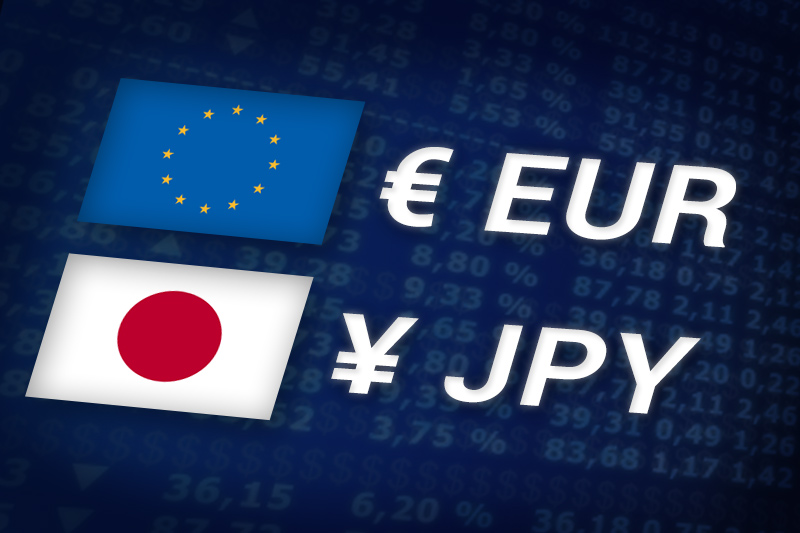Investing.com - The euro rose to a two-day high against the yen on Tuesday, after data showing that the ZEW index of German business sentiment recorded its largest ever monthly increase in January supported the single currency.
EUR/JPY hit 98.32 during European afternoon trade, the pair’s highest since January 13; the pair subsequently consolidated at 97.95, jumping 0.71%.
The pair was likely to find support at 97.02, the low of January 16 and an 11-year low and resistance at 99.34, the high of January 5.
Demand for the euro was boosted after the ZEW Centre said that its index of German business sentiment jumped to minus 21.6 in January, from the previous month’s reading of minus 53.8 and surpassing expectations for an increase to minus 49.2.
The ZEW index of economic sentiment in the euro zone also improved more-than-forecast in January, rising to minus 32.5 from minus 54.1.
A separate report showed that consumer price inflation in the single currency bloc rose less-than-expected in December, advancing 2.7% after a 2.8% rise the previous month.
Also Tuesday, Spain auctioned EUR4.9 billion of short-term government debt at sharply lower yields, indicating that investor sentiment has not been hit by last week’s sovereign ratings downgrade.
The euro had found support earlier after better-than-forecast data on Chinese fourth quarter economic growth boosted demand for riskier assets.
The data came after Standard & Poor’s downgraded the triple-A rating of the euro zone’s bailout fund by one notch on Monday, following Friday’s downgrade of nine euro zone sovereigns, including France.
Elsewhere, the yen was fractionally lower against the U.S. dollar with USD/JPY inching up 0.06%, to hit 76.83.
Earlier Tuesday, Bank of Japan Governor Masaaki Shirakawa met with Prime Minister Yoshihiko Noda to discuss the euro zone’s debt crisis after the euro hit an eleven-year low against the yen on Monday, fanning concerns over the impact of the strong yen on Japan’s largely export-based economy.
Meanwhile, data showed that tertiary industry activity in Japan declined more-than-expected in November, falling 0.8% after a 0.7% rise the previous month.
EUR/JPY hit 98.32 during European afternoon trade, the pair’s highest since January 13; the pair subsequently consolidated at 97.95, jumping 0.71%.
The pair was likely to find support at 97.02, the low of January 16 and an 11-year low and resistance at 99.34, the high of January 5.
Demand for the euro was boosted after the ZEW Centre said that its index of German business sentiment jumped to minus 21.6 in January, from the previous month’s reading of minus 53.8 and surpassing expectations for an increase to minus 49.2.
The ZEW index of economic sentiment in the euro zone also improved more-than-forecast in January, rising to minus 32.5 from minus 54.1.
A separate report showed that consumer price inflation in the single currency bloc rose less-than-expected in December, advancing 2.7% after a 2.8% rise the previous month.
Also Tuesday, Spain auctioned EUR4.9 billion of short-term government debt at sharply lower yields, indicating that investor sentiment has not been hit by last week’s sovereign ratings downgrade.
The euro had found support earlier after better-than-forecast data on Chinese fourth quarter economic growth boosted demand for riskier assets.
The data came after Standard & Poor’s downgraded the triple-A rating of the euro zone’s bailout fund by one notch on Monday, following Friday’s downgrade of nine euro zone sovereigns, including France.
Elsewhere, the yen was fractionally lower against the U.S. dollar with USD/JPY inching up 0.06%, to hit 76.83.
Earlier Tuesday, Bank of Japan Governor Masaaki Shirakawa met with Prime Minister Yoshihiko Noda to discuss the euro zone’s debt crisis after the euro hit an eleven-year low against the yen on Monday, fanning concerns over the impact of the strong yen on Japan’s largely export-based economy.
Meanwhile, data showed that tertiary industry activity in Japan declined more-than-expected in November, falling 0.8% after a 0.7% rise the previous month.
